Flaming Mountain is a famous attraction in Turpan, even in Xinjiang. It is in the northern margin of Turpan Basin and in the north section of the ancient Silk Road. Local people call it "kiziltag", which means "Red Mountain". That is also why it is called Flaming Mountain, partly for the red appearance and partly for the high temperature (it’s the hottest place in inland China). In the narrow sense, the Flaming Mountain refers to Flaming Mountain Scenic Area, which gets popularity among tourists because of the book Journey to the West. But actually, it covers a wider range and the surroundings are more worthwhile to visit, both naturally and culturally.
The aridness of the Flaming Mountain is attributed to the unique natural geographical conditions here. It is one of the branches of the Tianshan Mountains, which was formed in the Himalayan orogeny period of 50 or 60 million years ago. Tianshan is an area with intense geological activities. The horizontal coal seam buried in the stratum becomes inclined coal seam after many geological movements. When the coal seam outcrops and contacts with the air, the accumulated heat increases after oxidation. During the past millions of years, the numerous fold zones left by the lateral movement of the crust and the wind erosion and rain stripping of nature formed the undulating mountain and the vertical and horizontal ravines in this area. The temperature in the mountain area can reach 47 ℃ in summer, and the place direct in the sunlight can reach 80 ℃, which is hot enough to cook eggs.
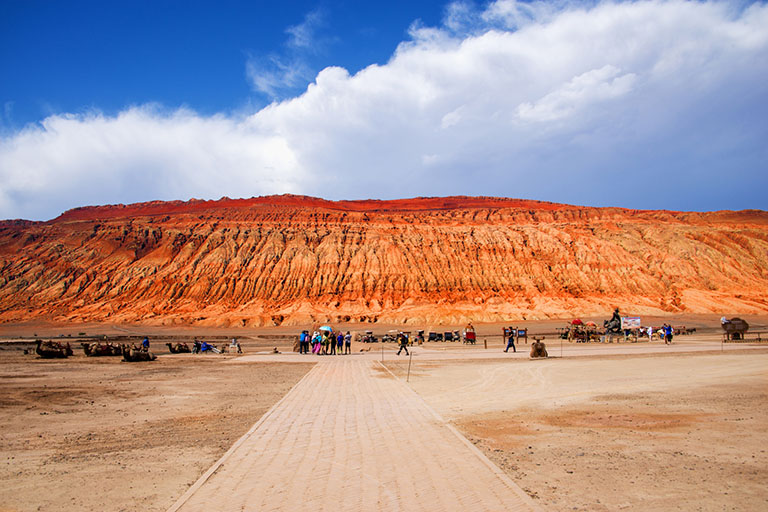 Flaming Mountain
Flaming Mountain
Flaming Mountain, in a broad sense, includes several attractions in this mountain range. Here are some recommended places such as Flaming Mountain Grand Canyon, Bezeklik Thousand Buddha Caves, Mazar Village, Grape Valley, and Gaochang Ancient City for you to appreciate the natural and cultural charm of Flaming Mountain.
Flaming Mountain is located in Turpan Basin, which is the lowest and hottest place in China. Influenced by the desert weather, the surface of the mountain is barren of grass. But due to the crustal movement, there are many valleys left in the mountains, which form canyons in the historically process. These canyons are like oases in the originally deserted land with green shade, beautiful scenery, gurgling water, and fragrant fruits. The most famous one is Tuyugou Grand Canyon.
Tuyugou Grand Canyon is 8 km long and about 1 km wide on average, cutting the Flame Mountain longitudinally from north to south. Its surface has a distinctive red color and is very magnificent seen from above, which is a vivid explanation of the name “Flaming Mountain”. The path in the valley is curved forward and the mountain stream meanders southward along the valley, forming an attractive scene with the surrounding red mountains.
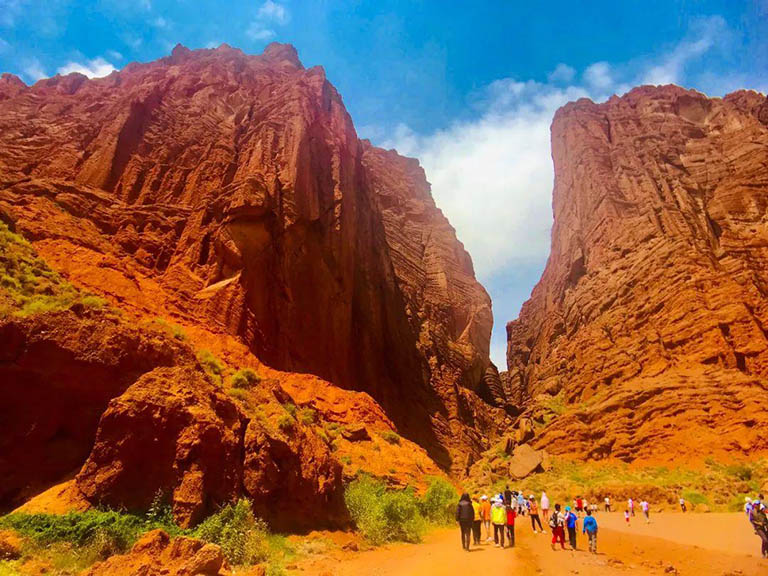 Flaming Mountain Grand Canyon
Flaming Mountain Grand Canyon
Bezeklik Thousand Buddha Caves is first excavated in the Gaochang period (A.D. 499 - 640) and went through prosperity to decline in later dynasties. There used to be 83 caves in Bezeklik Thousand Buddha Caves. Now only 57 caves exist and more than 40 of them are with murals. It is one of the largest Buddhist grotto sites in Xinjiang and is also the one with the highest standard, which was once the royal temple of Huihu Kingdom (A.D. 848 - early 13th century) in Gaochang. In 1982, with the approval of the State Council, Bezeklik Thousand Buddha Caves was listed as a national key cultural relics protection unit.
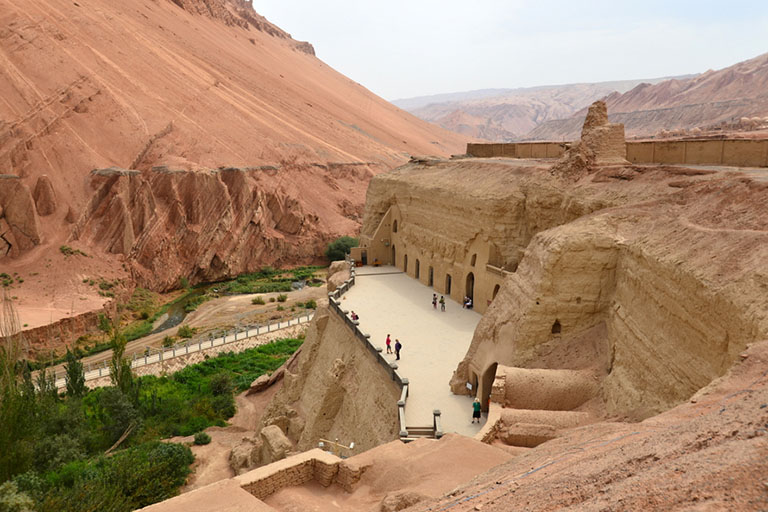 Bezeklik Thousand Buddha Caves
Bezeklik Thousand Buddha Caves
Mazar Village is a traditional village located in the south of Tuyugou Grand Canyon. It is an ancient historical and cultural village with a history of more than 2600 years. It is a typical representative of the village pattern under the cultural background of eastern Xinjiang, showing the traditional style of "ancient village, ancient residence, ancient lane and ancient tree".
The residences in Mazar Village are mainly two-layer buildings with yellow clay and raw soil. The upper layer is a bungalow, and the lower part is a cave dwelling which can withstand the summer heat. When it's hot, the villagers are used to sleeping on the roofs. At night, the stars are shining like thousands of diamonds in the sky. You can even see the Milky way clearly if lucky, just like the scene in the cartoon.
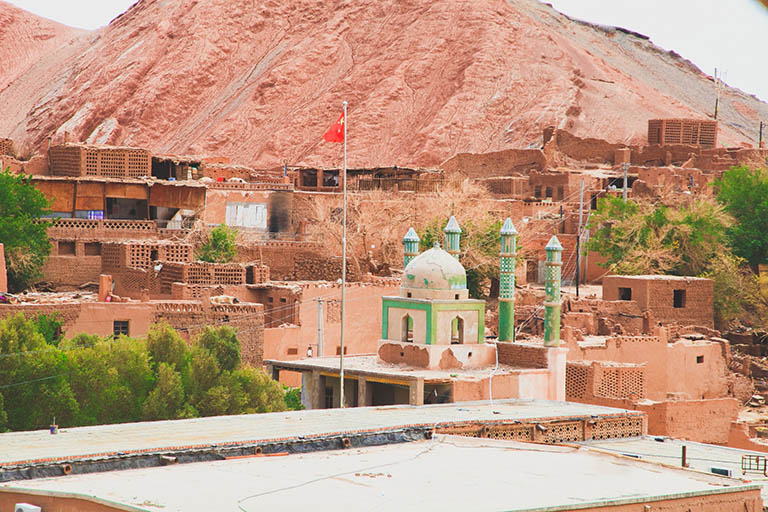 Mazar Village
Mazar Village
Grape Valley Scenic Area is a cool and humid oasis in the hot Flame Mountain. As the name implies, what’s most famous here is the dense grapes planted in the Grape Valley, which makes it one of the most popular scenic spots in Xinjiang.
Today's Grape Valley is kind of a must-go destination for tour groups. It is now equipped with Afanti Paradise, Wang Luobin Music and Art Gallery, Dawaz Folk Custom Garden, Oasis Grape Manor and Ethnic Village. Tourists can taste hundreds of different grapes, watch Uygur song and dance performances, visit Uygur dwellings, etc. There are also many shops selling grapes and raisins in the scenic area, but the price here is higher than that in Turpan city. If you want to buy some raisins and other gifts, it is recommended to buy them after going back to the city.
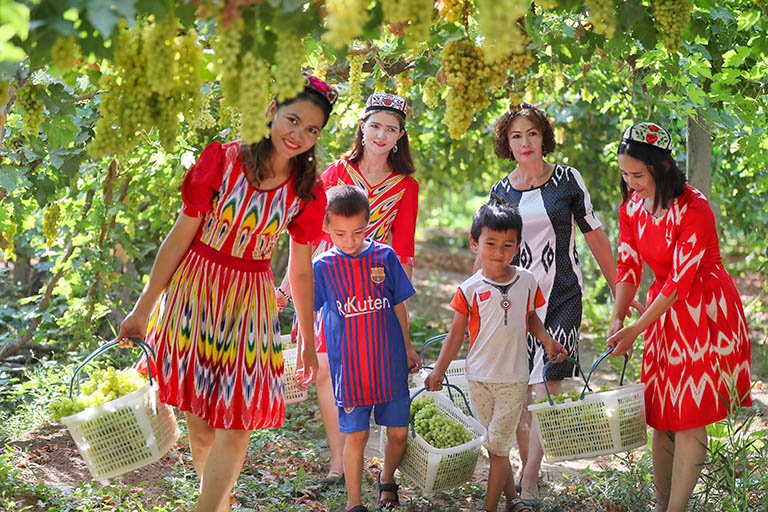 Grape Valley
Grape Valley
Gaochang Ancient City, or Gaochang Ruins, used to be the capital of Gaochang kingdom. It was a rectangle city with a circumference of 5.4 kilometers and nine city gates. It was divided into three parts: outer city, inner city and the palace. The outer wall was 12 meters wide and 11.5 meters high. Gaochang city was abandoned in the war at the end of the 13th century, and most of the buildings have faded away. At present, two temple sites are well-preserved in the southwest and southeast corner of the outer city, the latter of which was where Xuanzang, an eminent monk of the Tang Dynasty, lectured for over a month in A.D. 628 when he passed Gaochang in his journey to the west. After being exposed to the weather for more than 2000 years, the outline of the old city still exists, and the city wall stands majestically at the foot of the Flaming Mountain.
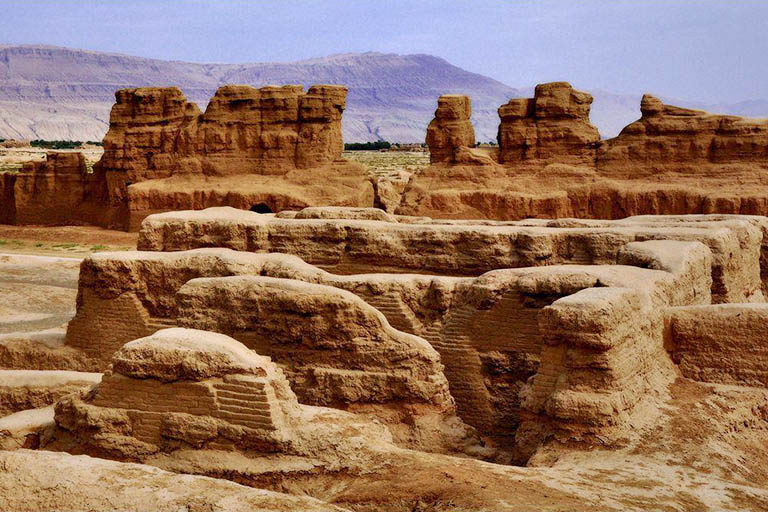 Gaochang Ancient City
Gaochang Ancient City
Route: Downtown → Grape Valley → Bezeklik Thousand Buddha Caves → Flaming Mountain Grand Canyon → Mazar Village → Gaochang Ancient City → Downtown
Generally speaking, you can visit a part of the Flaming Mountain range. Most people choose Flaming Mountain Grand Canyon for its appealing landscape and Bezeklik Thousand Buddha Caves for its precious murals. What’s more, these two attractions are near to each other with a distance of only 10 km. If time permits, it is also a good choice to have an in-depth Flaming Mountain travel. You can start from the Grape Valley, as it is closed to downtown. Then drive about 36 km (40 minutes) to Bezeklik Caves and the nearby Flaming Mountain Grand Canyon. After that, continue your journey for a 30-minute drive to the traditional and ancient Mazar Village in Tuyuk Valley. After that, catch the sunset in Gaochang Ancient City and drive back to Turpan downtown.
As Flaming Mountain includes many attractions, here we take Flaming Mountain Grand Canyon for example, it is about:
Turpan is on the Lanzhou-Urumqi High-speed Railway. Therefore, it is convenient to get to Turpan by high speed train from cities on the Silk Road such as Urumqi (1h), Dunhuang (3.5h), Zhangye (5h), Jiayuguan (6.5), Lanzhou (9.5-10h), Xining (8-8.5h), Xian (12.5h), etc. You can also fly to Turpan from Lanzhou (2.5h), Beijing (5.5h), Chengdu (5.5h), Changsha (4.5h), Zhengzhou (4.5h), etc. But the flight schedule is not stable. It is also available to get to Urumqi (the capital of Xinjiang) first, which has more flights between major cities in China, and then transfer to Turpan. Read more about Turpan Transportation >
Flaming Mountain Grand Canyon is a little far from downtown. Most people get there by taking a taxi or charting a car. No direct bus is available. You can take a bus from Turpan to Shanshan County and get off at Shengjinkou (胜金口), which is about 4 km to the Grand Canyon, and then find a local tuktuk to get you there.
Travel with China Discovery: If you want to get rid of hustle of public transportation and troublesome navigation, you can book a private tour package which covers sightseeing, dining and transfer from us. Our knowledgeable local tour guide and skilled driver will escort you to visit Flaming Mountain with speed and convenience, and take care of all the details. You just need to focus on sightseeing. Contact us to customize a worry-free tour package now!
 China Discovery Private Transfer
China Discovery Private Transfer
How to Get to Turpan: There are high speed trains to Turpan from Xian (about 12.5h), Lanzhou (about 9.5h), Xining (about 8h), Zhangye (about 6.5h), Jiayuguan (about 5h), Dunhuang (about 3.5h), etc. and flights from Urumqi (1h), Beijing (5.5h), Lanzhou (2.5h), Changsha (4.5h), Korla (1h), Burqin (1h15min), etc. Many travelers also travel to Urumqi by flight first and then transfer to Turpan.
Best Time to Visit Turpan: May to October is the best time to visit Turpan. It is cold in late autumn and winter (November ~ next February) and rather windy in early and mid-spring (March and April). The temperature is high in summer, but you will get a lot of sweet fruits.
Generally, a classic Turpan tour takes 2 ~ 3 days. If your time is limited, you can focus on the essence of Turpan City. We suggest you spend 1 day touring the highlights of Turpan City, such as Karez System - a magic project bringing out underground water to this barren land, Turpan Museum where lots of historical exhibits including mummies are collected and Jiaohe Ancient City - the world's largest and oldest city ruins, and another day exploring its attractive surroundings, including Bezeklik Thousand Buddha Cave with exquisite murals & profound Buddhist culture, Flaming Mountain Grand Canyon with breathtaking landform, and peaceful Mazar Village (in Tuyuk Valley) where people still live traditionally. If you have one more day, don't miss Kumtag Desert, a beautiful desert offering amazing desert landscape and many interesting activities (like jeep safari, desert hiking, desert surfing, etc.).
☛ 2 Days Turpan Essence Tour from Urumqi
Of course, it's far from enough if you just visit Turpan. Travelers always travel Turpan with Urumqi - the tourist center in northern Xinjiang together. It needs about 1~2 days to visit landmarks of Urumqi City, like Xinjiang Regional Museum, Red Hill Park and Erdaoqiao Grand Bazzar. Heavenly Lake, only 70 km away from Urumqi downtown is a must. If you are interested in Muslim culture and Silk Road culture, don't hesitate to go to Kashgar, one of Xinjiang's golden triangle tourist cities together with Turpan and Urumqi. In Kashgar, there is time-honored Kashgar Old City, yellow-tiled Id Kah Mosque, busy Grand Sunday Bazaar, etc.
☛ 5 Days Urumqi Discovery to Turpan and Heavenly Lake
☛ 6 Days Urumqi and Turpan Highlights Tour
☛ 8 Days Xinjiang Classic Tour (Urumqi - Turpan - Kashgar)
If your time allows, traveling along China's Silk Road is strongly recommended. You can trace the footprints of ancient travelers from Xian - China's old capital city of 13 dynasties, to Qinghai (Xining, Qinghai Lake), Gansu (Zhangye, Jiayuguan, Dunhuang) and Xinjiang (Urumqi, Turpan, Kashgar). An in-depth Silk Road tour can be 2 weeks long, but you can spend a shorter time admiring the essence at your own pace.
☛ 10 Days Classic Silk Road Tour (Xian - Dunhuang - Turpan - Kashgar)
☛ 11 Days In-depth Wild Silk Road Adventure Tour (Lanzhou - Zhangye - Jiayuguan - Dunhuang - Urumqi - Kasgar)
☛ 12 Days Silk Road Tour from Beijing (Beijing - Xian - Dunhuang - Turpan - Urumqi)
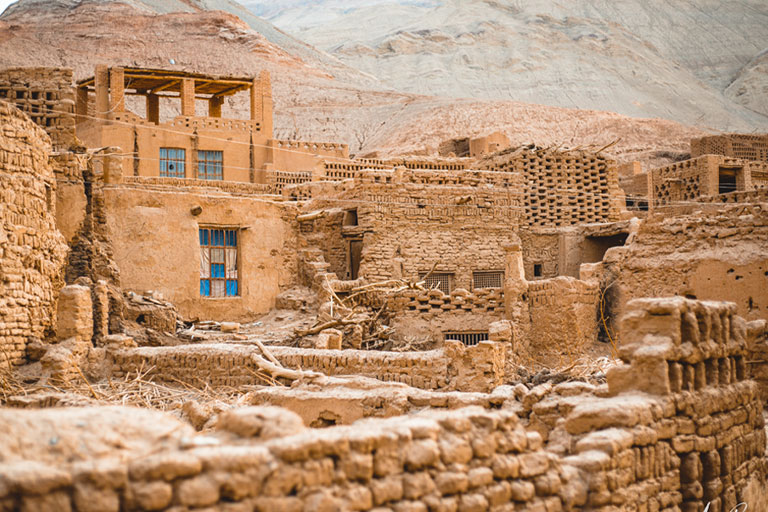 Mazar Village in Tuyuk Valley
Mazar Village in Tuyuk Valley
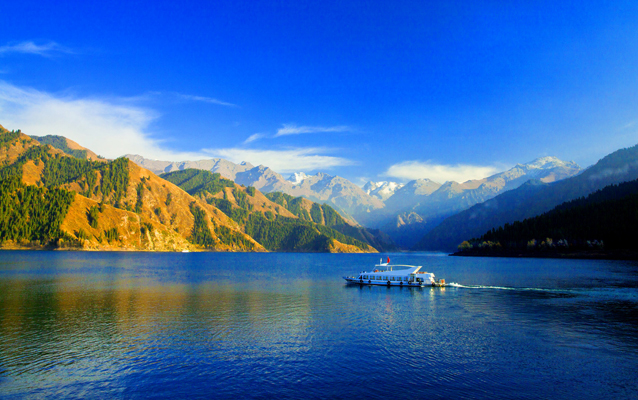 Heavenly Lake of Tianshan
Heavenly Lake of Tianshan
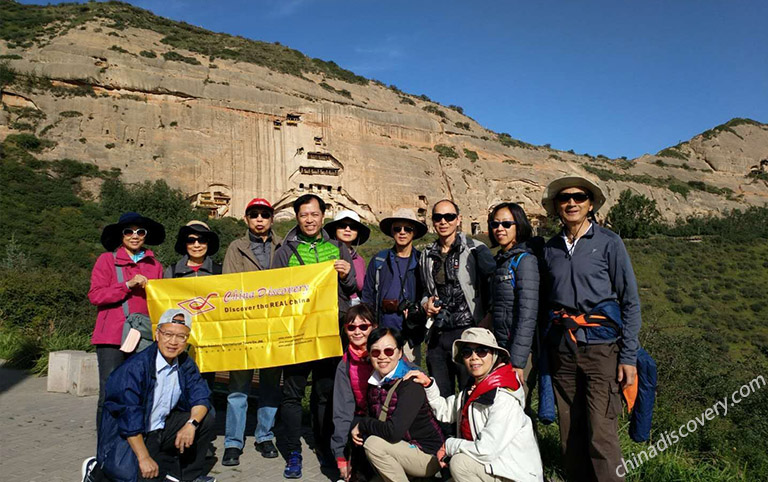 Mrs. Chan's group from Canada visited Matisi Temple along the Silk Road
Mrs. Chan's group from Canada visited Matisi Temple along the Silk Road
Top 3 Turpan tours chosen by most customers to explore Turpan in the best way. Check the detailed itinerary, or tailor your own trip now with us.
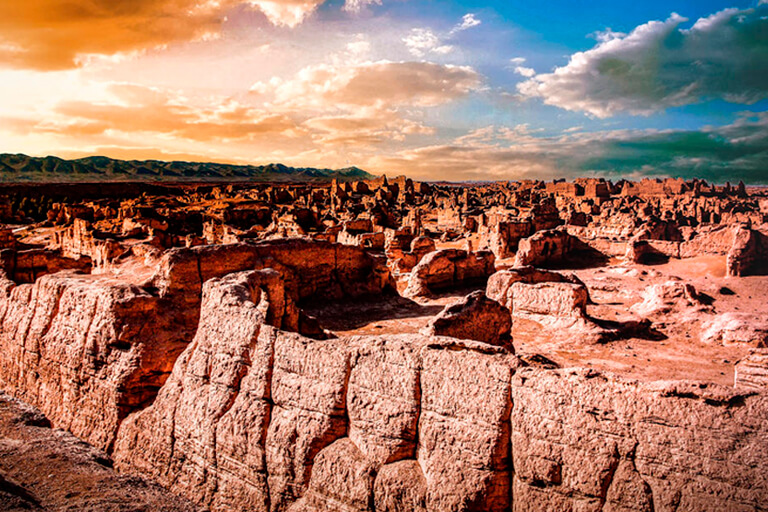
Urumqi - Turpan
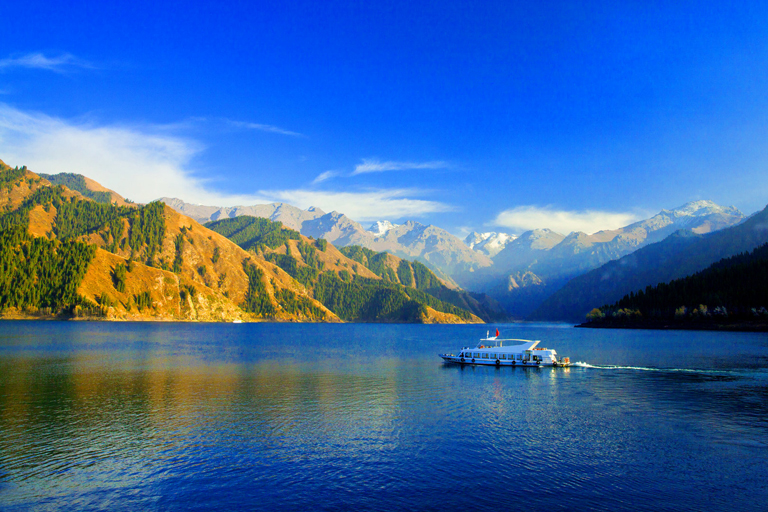
Lanzhou / Zhangye / Jiayuguan / Dunhuang / Turpan / Urumqi / Kashgar
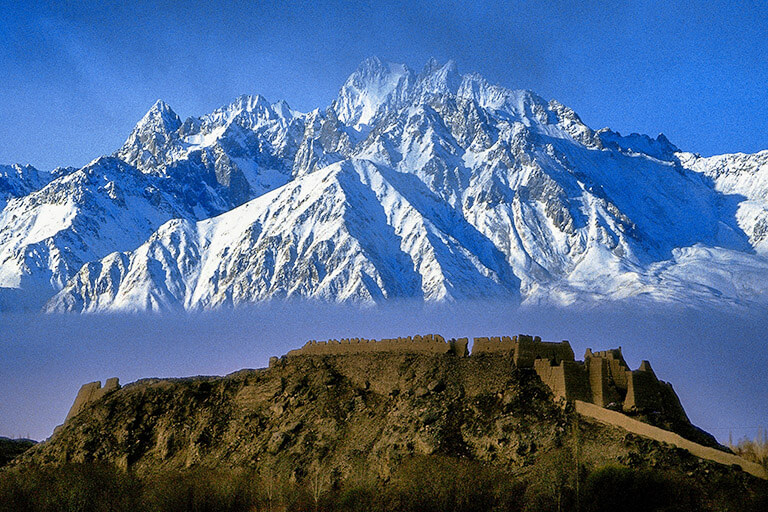
Urumqi - Turpan - Kashgar - Tashkurgan
Start planning your tailor-made holiday to China by contacting one of our specialists. Once inquired, you’ll get a response within 0.5~23.5 hours.
Customize a Trip